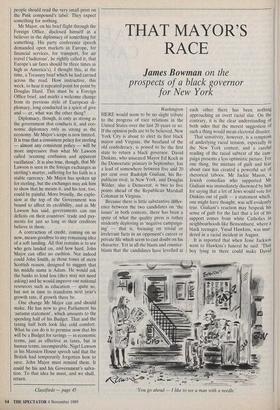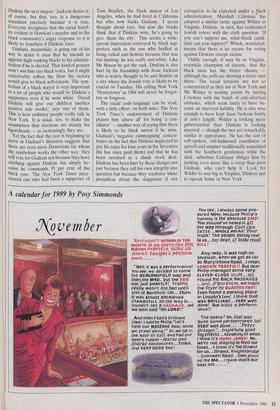THAT MAYOR'S RACE
James Bowman on the prospects of a black governor for New York
Washington HERE would seem to be no slight tribute to the progress of race relations in the United States over the last 20 years or so. If the opinion polls are to be believed, New York City is about to elect its first black mayor and Virginia, the hearland of the old confederacy, is poised to be the first state to return a black governor. David Dinkins, who unseated Mayor Ed Koch in the Democratic primary in September, has a lead of somewhere between five and 20 per cent over Rudolph Giuliani, his Re- publican rival, in New York, and Douglas Wilder, also a Democrat, is two to five points ahead of the Republican Marshall Coleman in Virginia.
Because there is little substantive differ- ence between the two candidates on 'the issues' in both contests, there has been a spate of what the quality press is rather stridently deploring as 'negative campaign- ing' — that is, focusing on trivial or irrelevant facts in an opponent's career or private life which seem to cast doubt on his character. Yet in all the blasts and counter- blasts that the candidates have levelled at
each other there has been nothing approaching an overt racial slur. On the contrary, it is the clear understanding of both sides that the merest suggestion of such a thing would mean electoral disaster.
That sensitivity, however, is a symptom of underlying racial tension, especially in the New York contest; and a careful reading of the racial subtext of the cam- paign presents a less optimistic picture. For one thing, the mixture of guilt and fear about race has created a powerful set of rhetorical taboos. Mr Jackie Mason, a Jewish comedian who supported Mr Giuliani was immediately disowned by him for saying that a lot of Jews would vote for Dinkins out of guilt — a statement which, one might have thought, was self-evidently true. Giuliani's reaction may bespeak his sense of guilt for the fact that a lot of his support comes from white Catholics in neighbourhoods like Bensonhurst, where a black teenager, Yusuf Hawkins, was mur- dered in a racial incident in August.
It is reported that when Jesse Jackson went to Hawkins's funeral he said: 'That boy lying in there could make David 'You go ahead — I like to see a tnan with a needle.' Dinkins the next mayor.' Jackson denies it, of course, but that, too, is a dangerous statement precisely because it is true. Everyone recognises that the racial hostil- ity evident in Hawkins's murder and in the black community's angry response to it is likely to resurface if Dinkins loses.
Giuliani, meanwhile, is going out of his way to make it clear that he intends to appoint high-ranking blacks to his adminis- tration if he is elected. That kind of gesture won't win him any black votes, but it might conceivably soften the blow his victory would give to black self-esteem. The sym- bolism of a black mayor is very important to a lot of people who would be Dinkins's supporters even if he were white. 'David Dinkins will give our children another positive role model,' says one of them. This is how ordinary people really talk in New York. It is usual, too, to make the assumption that elections are mainly for figureheads — as increasingly they are.
Yet the fact that the race is beginning to move in Giuliani's direction suggests that there are even more Democrats for whom the symbolism works the other way: they will vote for Giuliani not because they have anything against Dinkins but simply be- cause he commands 95 per cent of the black vote. The New York Times inter- viewed one who had been a supporter of
Tom Bradley, the black mayor of Los Angeles, when he had lived in California but who now backs Giuliani. 'I never thought about race, but now the blacks think that if Dinkins wins, he's going to give them the city.' This seems a wide- spread impression conveyed by black sup- porters such as the one who bridled at being called anti-Semitic because that was too limiting: he was really anti-white. Like Mr Mason he got the sack. Dinkins is also hurt by his friendship with Jesse Jackson who is widely thought to be anti-Semitic in a city where the Jewish vote is likely to be crucial on Tuesday. His calling New York `Elymietown' in 1984 will never be forgot- ten or forgiven,
The racial code-language can be read, with a little effort, on both sides. The New York Times's endorsement of Dinkins praises him 'above all' for being 'a con- ciliator' — another way of saying that there is likely to be black unrest if he wins. Giuliani's 'negative campaigning' concen- trates on the fact that Dinkins neglected to pay his taxes for four years in the Seventies (he has since paid them) and that he has been involved in a shady stock deal. Dinkins has been hurt by these charges not just because they call his own integrity into question but because they reinforce white prejudices about the sloppiness if not
corruption to:be expected under a black administration. Marshall Coleman has adopted a similar tactic against Wilder in Virginia. Dinkins, in turn, has confronted Jewish voters with the stark question: 'If you can't support me, what -black candi- date can you.support?' Which, translated, means that there is no excuse for voting against Dinkins except racism.
Oddly enough, it may be in Virginia, erstwhile champion of slavery, that the black man has the better chance although the polls are showing a closer race there. The racial tensions are not so concentrated as they are in New York and Mr Wilder is scoring points by tarring Coleman with the brush of anti-abortion attitudes, which seem lately to have be- come an electoral liability. He is also wise enough to have kept Jesse Jackson firmly at arm's length. Wilder is looking more gubernatorial than Dinkins is looking mayoral — though the two are remarkably similar in appearance. He has the sort of soft-spoken, old-fashioned courtliness of speech and manner traditionally associated with the Southern gentleman while the slick, suburban Coleman obliges him by looking even more like a creep than poor Giuliani, who can't help it. Look for Wilder to win big in Virginia; Dinkins just to squeak home in New York.

















































 Previous page
Previous page